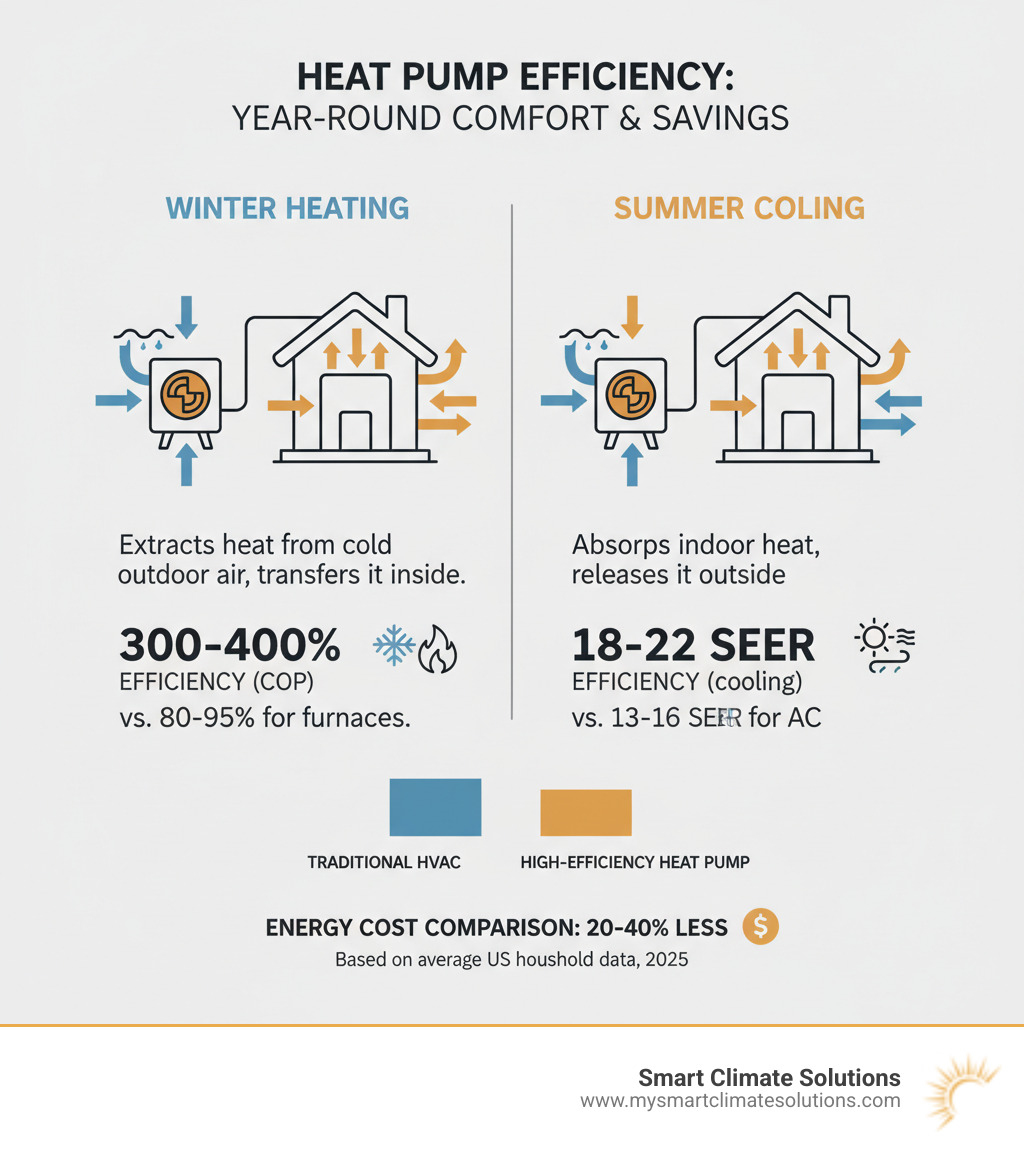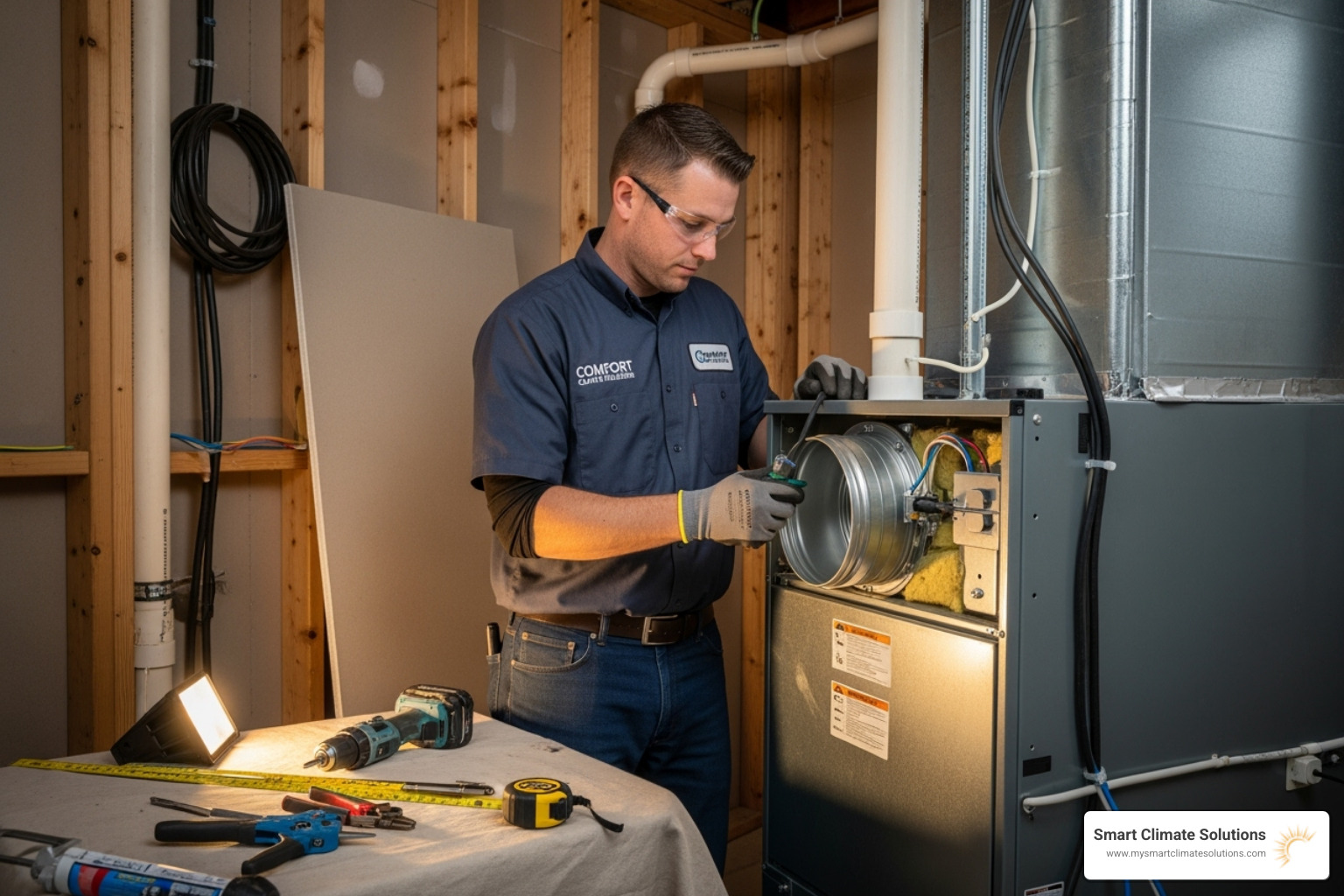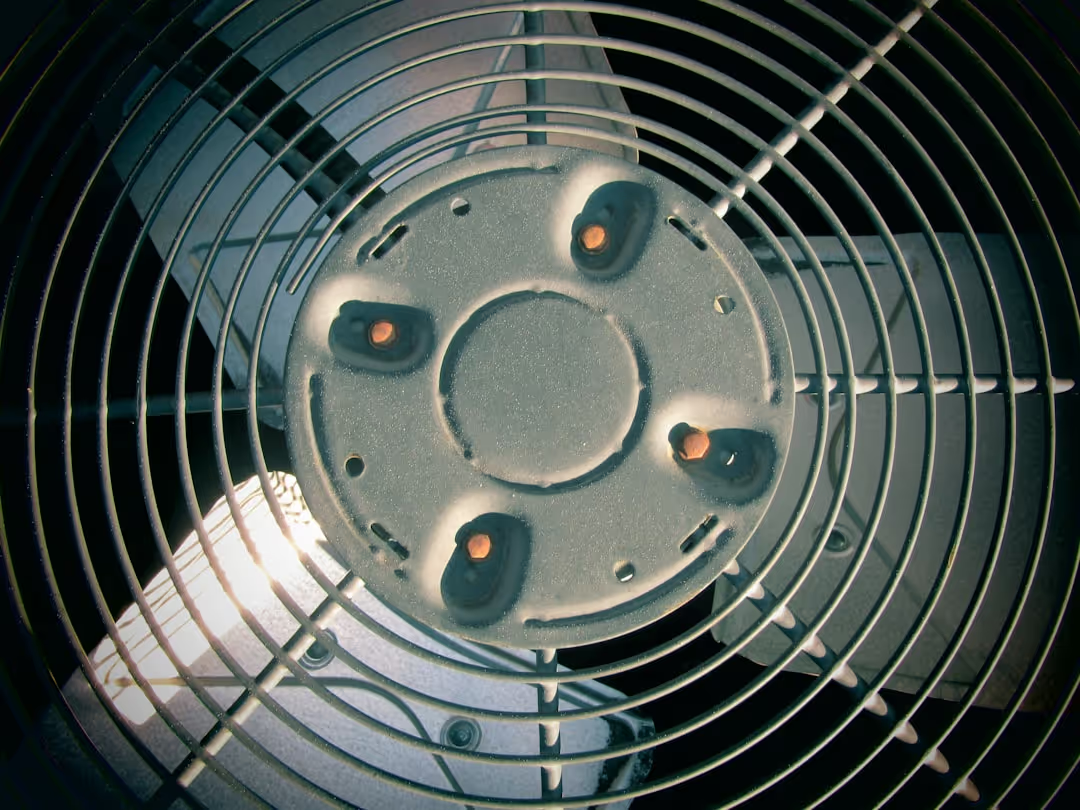Why High-Efficiency HVAC Systems Are Essential for Pittsburgh Homeowners
High efficiency heating and air conditioning systems are changing how homeowners approach comfort and energy savings. These advanced systems use cutting-edge technology to deliver superior performance while dramatically reducing energy consumption.
Key benefits of high-efficiency systems include:
- 20-40% reduction in heating and cooling costs
- Federal tax credits up to $2,000 for qualifying heat pumps
- Year-round comfort with both heating and cooling capabilities
- Reduced carbon emissions by up to 40% compared to gas furnaces
- Longer equipment lifespan with proper maintenance
The secret lies in how these systems work. As one industry expert explains, "Heat pumps are exceptionally energy-efficient and environmentally friendly..." because they move heat rather than generate it. This makes them far more efficient than traditional furnaces or air conditioners.
In Pittsburgh's challenging climate, with cold winters and humid summers, choosing the right system is critical. Modern cold-climate heat pumps can now operate effectively down to -22 degrees F, making them viable options even during our harshest winter weather.
I'm Bill Scott, and I've spent over 15 years helping Pittsburgh homeowners optimize their high efficiency heating and air conditioning systems. Through Smart Climate Solutions, I've guided thousands of customers toward the most efficient HVAC solutions for their specific needs and budget.

High efficiency heating and air conditioning helpful reading:
Understanding the Language of HVAC Efficiency
Shopping for high efficiency heating and air conditioning can feel like learning a new language with acronyms like SEER2, HSPF2, and AFUE. Think of these efficiency ratings like the miles-per-gallon sticker on a car. A higher rating means more savings on your energy bills.
Understanding these ratings is especially important in Pittsburgh, where our systems work hard through both sweltering summers and frigid winters. The right ratings can mean the difference between manageable utility bills and budget-breaking energy costs.
Key Efficiency Ratings Explained
Let's break down the three main ratings you'll see:
Seasonal Energy Efficiency Ratio 2 (SEER2) measures cooling efficiency. The higher the SEER2 number, the less electricity your system uses to keep you cool. As of 2023, SEER2 uses updated testing that better reflects real-world performance. For optimal efficiency, look for systems with a SEER2 rating of 16 or higher.
Heating Seasonal Performance Factor 2 (HSPF2) is for heat pumps and measures heating efficiency. Since we have long, cold winters in western Pennsylvania, this rating is crucial. An HSPF2 of 8.2 or higher indicates a highly efficient heat pump that won't break the bank during winter.
Annual Fuel Utilization Efficiency (AFUE) applies to furnaces and boilers. It measures how effectively they convert fuel into heat. An AFUE rating of 90% means 90 cents of every dollar you spend on fuel heats your home, while only 10 cents is wasted.
The ENERGY STAR Seal of Approval
Beyond the numbers, look for the ENERGY STAR certified system label. This third-party certification guarantees your system meets strict energy efficiency guidelines set by the U.S. Environmental Protection Agency.
An ENERGY STAR certified high efficiency heating and air conditioning system offers superior performance, lower operating costs, and a reduced environmental impact. The rigorous testing and verification process means you can trust the system will live up to its efficiency promises.
Types of High-Efficiency HVAC Systems
When you upgrade your home's comfort system, high efficiency heating and air conditioning offers several impressive options. Choosing the right one depends on your home, budget, and Pittsburgh's climate.
Air-Source Heat Pumps: The Two-in-One Solution
Air-source heat pumps are the Swiss Army knife of HVAC. They don't create heat; they move it. In winter, they pull heat from the outside air and bring it indoors. In summer, they reverse the process, moving heat from inside your home to the outside.
Ducted heat pumps use your existing ductwork to distribute air. This can be a straightforward upgrade if your ducts are in good condition.
Ductless mini-splits are perfect for homes without ductwork or for zone control. They connect an outdoor unit to indoor heads, avoiding the 20-30% energy loss common with leaky ducts.
Geothermal and Hybrid Systems
Geothermal heat pumps use the earth's stable temperature (around 50-55 degrees F) to exchange heat. They are incredibly efficient but have a higher upfront cost due to the installation of underground loops.
Hybrid systems are ideal for Pittsburgh's climate. They pair an efficient heat pump with a gas or oil furnace. The heat pump handles most heating and all cooling, but the system automatically switches to the furnace when temperatures drop below about 30-35 degrees F, ensuring cost-effective warmth on the coldest days.
| System Type | Initial Cost | Operating Cost | Best Climate Suitability |
|---|---|---|---|
| Air-Source Heat Pumps | Moderate | Low | Moderate to Cold Climates (with modern cold-climate HP) |
| Geothermal Heat Pumps | High | Very Low | All Climates (stable performance regardless of temp) |
| Hybrid (Dual-Fuel) Systems | Moderate-High | Low | Cold Climates (combines HP efficiency with furnace power) |
For more detailed information, check out our guide to Residential HVAC Solutions.
Choosing the Right High-Efficiency Heating and Air Conditioning System
Choosing the perfect high efficiency heating and air conditioning system isn't a one-size-fits-all process. At Smart Climate Solutions, we understand that the best solution comes from looking at your home as a complete system.
Factors for Selecting a High-Efficiency Heating and Air Conditioning System
When we assess your home, we analyze several key factors to find the best system for you:
- Home Size and Layout: A ranch house has different needs than a two-story colonial. Open floor plans and separate rooms also affect heating and cooling patterns.
- Insulation and Air Leaks: A leaky, poorly insulated home will struggle to stay comfortable, no matter how efficient the HVAC system is. Addressing these issues is a smart first step and may qualify for federal tax credits up to $1,200.
- Pittsburgh's Climate: We need systems that can handle both humid 90-degree summers and sub-zero winter days. Modern cold-climate heat pumps are designed for these extremes.
- Electrical System: Older homes may have electrical panels that can't support a large heat pump without an upgrade. A federal tax credit of up to $600 can help offset this cost.
- Ductwork Condition: Leaky ducts can waste up to 30% of your conditioned air. In some cases, a ductless system is more efficient than using old, damaged ductwork.
Find more ways to improve performance with our Energy Saving HVAC Tips.
The Benefits: Lower Bills and a Greener Home
Upgrading to high efficiency heating and air conditioning pays you back in multiple ways:
- Reduced Energy Consumption: Lower energy use means lower monthly utility bills, often saving hundreds of dollars per year.
- Smaller Carbon Footprint: Switching from a gas furnace to an electric heat pump can reduce your home's heating-related carbon emissions by about 40%.
- Increased Home Value: An energy-efficient home is a major selling point for future buyers.
The financial incentives are better than ever. Homeowners can get a tax credit worth 30 percent of the cost, up to $2,000, for qualifying heat pumps and necessary electrical upgrades.
When a Heat Pump Might Not Be the First Choice
While heat pumps are a great solution, they aren't always the best first step. Consider these situations:
- Poorly Insulated Homes: It's more effective to improve insulation and seal air leaks before upgrading your HVAC system.
- Outdated Electrical Service: If your panel needs an upgrade, it's best to do it with the HVAC installation. The available tax credit helps make this more affordable.
- Extreme Cold: While modern units are robust, a hybrid system with a furnace backup provides peace of mind during Pittsburgh's harshest cold snaps.
- Budget Constraints: The upfront cost can be significant. We work with homeowners to find solutions that fit their budget while improving comfort and efficiency.
Maximizing Performance: Installation and Maintenance
Getting the most from your high efficiency heating and air conditioning system depends on two things: correct installation and proper maintenance. Too often, we see homeowners frustrated because an 'efficient' system isn't delivering savings due to one of these issues.
Why Professional Installation is Non-Negotiable for High-Efficiency Heating and Air Conditioning
Even the best system will disappoint if installed incorrectly. Professional installation is not just a recommendation; it's essential for performance and safety.

A qualified technician performs a Manual J load calculation to determine your home's exact heating and cooling needs. This prevents installing a system that is too large or small, both of which waste energy and shorten the equipment's lifespan.
Proper installation also includes:
- Duct Sealing: We ensure your ductwork is sealed to prevent air loss, which can waste up to 30% of your conditioned air.
- Correct Refrigerant Charging: Too much or too little refrigerant can slash efficiency and damage the system.
- Warranty Protection: Most manufacturers require certified installation to keep your warranty valid.
Our certified technicians ensure your system performs as designed. Learn more about our HVAC Installation Services.
Essential Maintenance for Lasting Efficiency
Once installed, regular maintenance is key. A few simple steps can make a big difference:
- Change your air filter regularly (every 1-3 months).
- Keep your outdoor unit clear of leaves, snow, and debris.
- Ensure indoor vents are open and unblocked.
Annual professional tune-ups are crucial. Our technicians perform a comprehensive check that can improve efficiency by 20-30% compared to a neglected system. It also helps catch small problems before they become expensive emergencies. Learn more about our HVAC Service and Repair.
Backup Heating for Pittsburgh Winters
Even the best heat pumps can use help on the coldest Pittsburgh days. Electric resistance strips are a common backup built into the indoor unit. A dual-fuel system, which pairs a heat pump with a furnace, is another great option. It automatically switches to the most cost-effective heating source based on the outdoor temperature.
Modern cold-climate heat pumps can often provide 100% of your home's heating down to 5 degrees F, but having a reliable backup ensures you stay warm no matter what.
Frequently Asked Questions about High-Efficiency HVAC
Homeowners exploring high efficiency heating and air conditioning often have similar questions. Here are the answers to the ones we hear most at Smart Climate Solutions.
Are modern heat pumps really effective in cold climates like Pittsburgh?
Absolutely. For years, heat pumps struggled in cold weather, but modern cold-climate models are game-changers. They are engineered to operate efficiently even when temperatures drop to 5 degrees F or lower, with some models working in temperatures as low as -22 degrees F.
For the few days when temperatures are extremely low, a hybrid system with a backup heating source ensures you stay warm and comfortable. The system automatically switches to the most efficient heating method, giving you the best of both worlds.
How much money can I actually save by upgrading?
Savings depend on your old system and utility rates, but homeowners who upgrade to an ENERGY STAR certified system typically see 20-40% reductions on their heating and cooling bills. For many local families, this means hundreds of dollars in annual savings.
Plus, federal tax credits can significantly lower the upfront cost. You can claim a credit for 30% of the cost, up to $2,000 per year, for qualifying heat pumps. This investment often pays for itself much faster than you might think.
What is the difference between SEER and the new SEER2 rating?
SEER2 is an updated testing standard from 2023 that better reflects real-world conditions. The testing process now simulates how a system performs when connected to a home's ductwork, giving a more accurate measure of efficiency.
Think of it as testing a car's MPG on real roads instead of a perfect test track. Because the SEER2 test is more rigorous, the numerical ratings may appear slightly lower than older SEER ratings, but it's a more honest and reliable measure of performance for your high efficiency heating and air conditioning system.
Conclusion
Investing in high efficiency heating and air conditioning is a smart choice for any homeowner looking to improve comfort, reduce energy bills, and contribute to a healthier planet. We've seen how understanding efficiency ratings like SEER2, HSPF2, and AFUE empowers you to make informed decisions. We've explored the benefits of advanced systems like air-source heat pumps, geothermal, and hybrid solutions, and highlighted the critical role of professional installation and diligent maintenance.
The long-term value of a high-efficiency system extends beyond monthly savings; it provides consistent comfort, improved indoor air quality, and the satisfaction of a smaller carbon footprint. For homeowners in Pittsburgh, South Hills, Burgettstown, Washington, PA, Steubenville, OH, St. Clairsville, OH, and Weirton, WV, embracing these technologies means a more comfortable and sustainable home, perfectly suited to our diverse climate challenges.
At My Smart Climate Solutions, we're more than just HVAC technicians; we're your partners in achieving peak home efficiency. With over 15 years of experience, certified technicians, and 24/7 support, we're dedicated to ensuring your comfort and satisfaction.
Ready to explore how high efficiency heating and air conditioning can transform your home? Contact us for expert HVAC services today!






.avif)
.avif)
.png)
